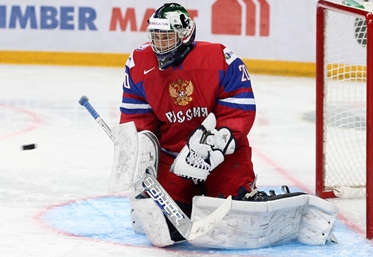Double trouble again
Double trouble again
Russia brings back goalies Makarov and Vasilevski

 Russian goalie Andrei Makarov (#20) has shone in 2013 in his repeat engagement with fellow netminder Andrei Vasilevski. Photo: Andre Ringuette / HHOF-IIHF Images
Russian goalie Andrei Makarov (#20) has shone in 2013 in his repeat engagement with fellow netminder Andrei Vasilevski. Photo: Andre Ringuette / HHOF-IIHF Images
Since the IIHF adopted the playoff system for this tournament back in 1996, no U20 finalist has ever come back with the same goaltending tandem – until now. Usually, at least one goalie has graduated to the pro ranks, or a potential returnee has been displaced by a superior netminder. Or they're simply too old.
However, Andrei Makarov won’t turn 20 till April, and Andrei Vasilevski turns 19 in July. They both shone in Calgary last year, Vasilevski carrying the load until Makarov took over in the semi-finals against Canada and the final versus Sweden, a 1-0 overtime loss for Russia. There was really no good reason not to bring them back.
And even though Makarov lost this year’s Group B round-robin finale versus Canada (4-1), both the Saskatoon Blades netminder and his partner from the MHL’s Tolpar Ufa have excelled again under coach Mikhail Varnakov.
Heading into the quarter-finals against Switzerland, they rank 1-2 in save percentage among all tournament goalies (Vasilevski 97.3, Makarov 95.5).
Along with Canada’s Malcolm Subban, the U.S.’s John Gibson, and the Czech Republic’s Patrik Bartosak, the two Andreis are certainly in the conversation for all-star team berths and the directorate’s Best Goalie award at this point.
In the Soviet era, the Russians twice put the same two goalies on their roster in back-to-back years at the IIHF Ice Hockey U20 World Championship. Both times, that approach paid off handsomely.
In 1986, the duo of Yevgeni Belosheikin and Oleg Bratash returned for the World Juniors in Hamilton, Ontario. But accurately speaking, this was the Belosheikin Show, one of the lifetime highlights for a man who would tragically die at age 33. After settling for bronze the year before in Helsinki, the 19-year-old CSKA Moscow backstop won all seven games the Soviets played en route to gold.
Going further back, in 1978 Alexander Tyzhnykh and Sergei Mylnikov split duties in Montreal for the second straight year. Although Mylnikov did win one game at that U20 tournament, Tyzhnykh was clearly the designated starter both times.
What’s interesting is that Mylnikov, a product of Traktor Chelyabinsk, would go on to a much more successful senior IIHF career. He would capture an Olympic title in Calgary in 1988, plus three World Championship gold medals.
By contrast, Tyzhnykh’s subsequent international appearances were limited to two exhibition games and two official games in the 1984 Canada Cup. Beyond that, his main claim to fame was backing up Vladislav Tretiak with CSKA Moscow in the late 1970s and early ’80s.
In the post-Tretiak era, goaltending has traditionally been considered an Achilles heel for this hockey superpower. But with two highly competent goalies, Varnakov always has a backup plan in Ufa. It will be fascinating to observe how Makarov and Vasilevski handle the pressure of playing on home ice for Russia in the elimination games this year.
Back to Overview





















































